A new report has been published evaluating lupus care in Wales, using information from people living with lupus and healthcare professionals. The report found some strengths of how care for lupus is delivered, and some areas which could be improved. The findings and conclusions will be considered by the NHS in Wales when planning how to design and plan services.
Background
Each of the nations of the UK has its own NHS system, so care for people living with lupus can sometimes be organised differently, for example how you access a particular treatment.
There has been previous research about how care is organised and experienced by people with lupus, but this research usually doesn’t include many people who live in Wales. This means people who design services can’t be certain how much the findings apply to Wales.
NHS Wales wanted to understand the strengths and areas for improvements in services for people with lupus in Wales, and explore the opportunities for improved care.
Who wrote this report?
An independent NHS research group called CEDAR did the evaluation and wrote the report. They worked with NHS Wales and it was funded by the Welsh Government.
How did they evaluate lupus care in Wales?
CEDAR used surveys, interviews, and focus groups with people with lupus in Wales to find out about their experiences. They also had a survey for healthcare professionals to find out their views and so they could see if there were any differences in the opinions of people living with lupus and healthcare professionals.
Lupus UK were involved in designing the survey and interview questions.
 What were the findings?
What were the findings?
288 people living with lupus and 17 healthcare professionals completed the surveys. 15 people with lupus took part in individual interviews, and 15 people took part in focus groups.
The evaluation found some aspects of lupus services that are working well, and other aspects which could be improved. There were lots of different findings, but some of the key conclusions were:
- People with lupus in Wales have a range of experiences, with some people reporting positive experiences of their care, and others reporting negative or more difficult experiences.
- The positive experiences about care in Wales included:
- Some people with lupus reported they had good support from their healthcare team, such as their rheumatologist or specialist nurse.
- The majority of healthcare professionals and people with lupus reported that there was good access to some treatments, like biologic medicines, in Wales.
- Some of the healthcare professionals worked in multi-disciplinary teams (MDTs). They highlighted this as a particular strength of the service they provided because it means different types of specialists can work together closely to support expert care for their patients.
- There was lots of agreement between people with lupus and healthcare professionals about what would improve services in Wales. This included:
- Better co-ordination between different healthcare professionals involved in a person’s care.
- Improving navigation of the healthcare system for diagnosis, monitoring, treatment, and rapid access during flares.
- Improving access to specialist support and lupus clinics
- More access to emotional and mental health support.
The report includes some suggestions that could support those improvements, such as personalised monitoring plans and lupus advice phonelines.
You can read the full report here (in English or Welsh): NHS Wales Lupus Service Evaluation
What happens next?
NHS Wales will use this report to help them understand what works well in lupus services, and what may need to be improved.
In 2024, NHS Wales set up the National Strategic Clinical Networks to support collaborative working, reduce variation in care, and improve outcomes. Lupus comes under the “Network for Musculoskeletal (MSK) Conditions”. The MSK Network will use this report, in combination with other reports and information, to help them design and plan services for people with lupus in Wales.
What do Lupus UK and others think about the report?
Caroline Olshewsky, Lupus UK CEO, said:
“This report clearly shows a clear and urgent need for more responsive and coordinated services for people with lupus in Wales. Through enhancing access to specialist care, monitoring people with lupus, providing timely interventions during flare-ups, and addressing the mental health and emotional wellbeing needs of people living with lupus, patient experiences can be improved.”
Dalila Tremaris, Patient Representative working on the report:
“I appreciate all the hard work that has gone into listening to the voices of people with lupus in Wales. This report has highlighted the current challenges we face in living with this complex chronic condition, and it brings hope that this will mark the beginning of the specialised care and support we need.”
Dr Ceril Rhys-Dillon, Clinical Lead for the Wales Rheumatology Clinical Implementation Network said:
“This detailed and valuable report builds on the previous evaluation of care for people with lupus in Wales published by Wright et al in 2023. It provides an in-depth analysis of the current level of service available to people with lupus in Wales and gives clear direction for where improvements are needed. As a Clinical Implementation Network we are keen to focus on key areas highlighted by the report.
First, shortening the time to diagnosis, a metric that can be evaluated through participation with the National Early Inflammatory Autoimmune Diseases Audit. Second, ensuring patients with lupus have access to clinical and emotional support during treatment flares, by pressing for funding for a network of Lupus Specialist Nurses across Wales and by increasing the co-production of care delivery with Lupus UK. Our third key area for improvement will involve co-ordination of multi-speciality input for patients with complex lupus by working to establish multi-disciplinary teams and networks within Wales, but also linking with networks in England where necessary.
There is work to be done and this report will serve as an excellent resource to guide us.”

